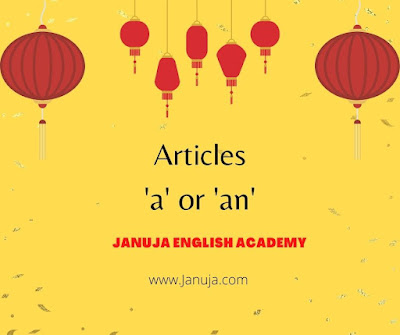There are two articles in the English Language:
1) the indefinite article ( ‘a’ or ‘an’ )
2) the definite article ( ‘the’ )
Usage of indefinite article ( ‘a’ or ‘an’ ):
1. The indefinite article is used with a singular countable noun.
The article ‘a’ is used before a word that begins with a consonant sound, while ‘an’ is used before a word that begins with a vowel sound. ( There are 20 vowel sounds and 24 consonant sounds in English )
a pen
a choice
a tall building
an employee
an oak tree
an interesting story
2. Some words start with a vowel letter ( a, e, i, o, u ), but have a consonant sound. So, ‘a’ is used before them
a university
a universal rule
a European woman
3. There are some words which start with a silent ‘h’. In such cases, ‘an’ is used.
an hour
an honest man
an honourable teacher
an heir
But, when ‘h’ is pronounced, we use ‘a’
a humble man
a hint
a humorous person
a historian
4. ‘An’ is used before abbreviations which begin with A, E, F, H, I, L, M, N, O, R, S or X and that are pronounced as individual letters.
an ISI product
an LLB student
an RMP doctor
an MP
an HCL product
an SBI card
But if the abbreviation is said as a word ( acronym ) and begins with a consonant sound, ‘a’ is used before it
a SAARC country
a NATO member
5. a/an is used before singular countable noun which mean ‘one’.
Aditi has stayed in Delhi for a month.
Dad gave her a hundred rupee note.
Shall I ask you a question?
6. a/an sometimes means ‘anyone’ of a particular type.
Have you got a pen?
They are searching for a house.
7. a/an is also used for a person’s occupation.
His father is a politician.
Sarada was an actress.
Anusha is an English lecturer.
Practice
Use the appropriate article ('a' or 'an') in the following blanks.
1. Meenakshi is _______ film actress.
2. Sri Lanka is _______ SAARC country.
3. There is _______ SBI ATM near our house.
4. Gravity is _______ universal principle.
5. My father brought ________ ox.
6. Neesha gave me _______ hint.
7. Her father is _______ RMP.


